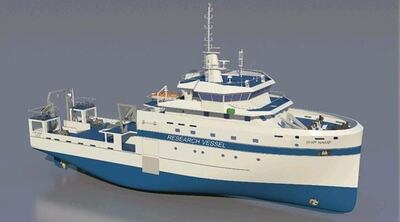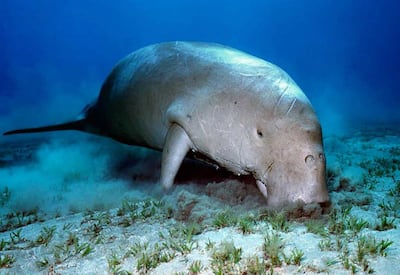It will be one of the most unusual vessels ever to set sail on the Arabian Gulf, and also an engineering and scientific marvel.
Due to arrive late next year, Environment Agency – Abu Dhabi’s first research ship will bring important new insights to the environment and habitat of the UAE’s waters.
Shamsa Mohamed Al Hameli, an assistant scientist at EAD fisheries, is part of the team ready to board the new vessel, which will be at sea for around 15 to 20 days at a time.
“It's like a dream come true, honestly,” she said. “I can't wait to start and until it's here and we start doing some work on the vessel.”
Her excitement is justified. Work on key issues like fish stocks and marine habitats has mostly been restricted to the assessment of catches on land or operating just off the coast.
The new 50-metre ship, with a crew of 30, will help provide new insights into the Arabian Gulf’s environmental health.
Building the ship fit for this task is also something of a challenge. Other countries with scientific research ships typically operate in much colder waters, often in the Arctic and Antarctic.
With sea water temperatures sometime reaching 33°C – not far short of a shower or bath – the Arabian Gulf offers challenges at the other end of the spectrum.

“Building an asset for our region is challenging for the shipyard because of the difficulty with the heat,” said Ms Al Hameli.
“It’s similar to any other, like cars or yachts. There's always an issue with overheating and AC, for example.”
The ship is currently under construction at the Freire shipyard in Vigo, north-west Spain, with sea trials in the Atlantic scheduled for next year.
By December 2022, it is hoped the ship will have arrived in the Gulf, when more trials will be conducted by Abu Dhabi Ship Building before it is ready for work with the EAD.
The name and the final colour scheme of the vessel have still to be revealed, but its specifications include being able to operate in 10 metres of water, as well as the Arabian Sea off Fujairah.

While the maximum depth of the Arabian Gulf is around 90 metres, it is much shallower off the UAE’s coast, typically 20 metres or less.
On board, scientists will have access to five state-of-the-art laboratories, each examining different research areas.
Considering her own specialist area, Ms Al Hameli says: “We'll have a platform where we can monitor our fish stocks.”
Most monitoring currently is based on examining catches, but the equipment on the ship will detect living fish in their natural habitat.
“We'll have different research to confirm what we're finding in our fish stocks. [This will] make sure that the results we are getting based on fish landings are supported by other research,” she says.
Other research will look at dolphin populations and there will be a first chance to see if dugongs – plant-eating marine mammals – are found in deeper waters.
Researchers will also assess the coverage sea grass – the staple food of dugongs.
Salinity and water temperature, including the impact of climate change, will also be studied along with the deepwater habitat of coral.

In the past, the EAD chartered a research vessels study fish stocks, but the new ship will bring a new dimension to what can be achieved.
“I really can't wait for it to finish and, get on board,” said Ms Al Hameli.
“If you see the specifications of the labs, you'd feel like it's like an actual laboratory in the middle of the ocean where you can finish the whole thing from A to Z, instead of just getting the sample and going back on land.”







